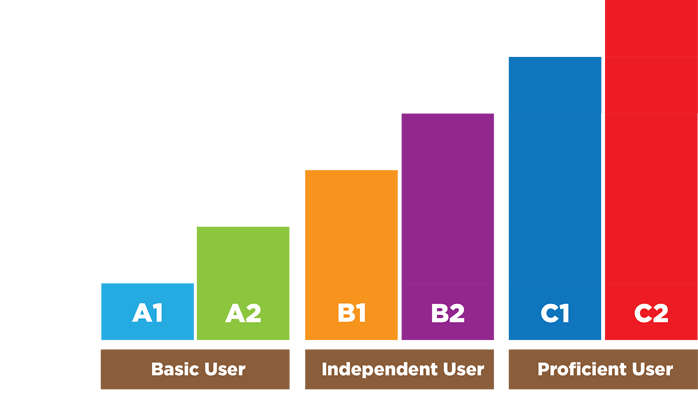The Common European Framework of Reference for Languages (CEFR) is a way of describing language ability and is often used to help language learners choose learning materials and courses at the right level.
The CEFR has six levels, from A1 for beginners, up to C2 for users who are proficient in the language. For each level, the CEFR describes what a learner can do when speaking, reading, listening and writing in English.

What can an A1-level learner of English do?
Learners who achieve A1 Elementary level:
•can understand and use very common everyday expressions and simple phrases for immediate needs
•can introduce themselves and other people and can ask and answer questions about personal details, such as where they live, things they have and people they know
•can communicate in a simple way if the other person talks slowly and clearly.
•understand very basic directions from natives.
•get around cities by reading simple signs, posters and notices.
•write very simple descriptions of their families, hobbies and interests.
•have a vocabulary of 1300-1500 words
•need to take approximately 100 hours of English
What can an A2-level learner of English do?
Learners who achieve A2 Pre-intermediate level:
•can understand sentences and common expressions about familiar topics, including very basic personal and family information, shopping, places of interest and work
•can communicate in simple, everyday tasks that require only simple and direct exchanges of information on familiar topics
•can describe aspects of their past, environment and matters related to their immediate needs, express their future plans using simple language.
•talk with English speakers, and network with English-speaking colleagues on familiar topics.
•have a vocabulary of 2200-2600 words
•need to take approximately 180-200 hours of English
What can a B1-level learner of English do?
Learners who achieve B1 Intermediate level:
•can understand the main points of clear texts on familiar topics in standard language
•can manage most situations on a trip to places where English is used
•can produce simple, organised texts about familiar topics
•can describe experiences, events, wishes and aspirations, and explain opinions and plans.
•listen to and understand English TV shows, but you still need English subtitles on.
•follow the plot in fairly simple English stories and understand what’s going on in the news.
•have a vocabulary of 2900-3200 words
•need to take approximately 320-360 hours of English

What can a B2-level learner of English do?
Learners who achieve B2 Upper intermediate level:
•can understand the main ideas of complex texts on concrete or abstract topics, including some technical discussions
•can express themselves fluently and spontaneously enough to comfortably communicate with other English speakers
•can produce clear, detailed text on many subjects and explain a complex viewpoint on a topic, including expressing advantages and disadvantages.
•understand the main ideas when reading a complex text, as well as contemporary literary prose, articles, and reports.
•have a vocabulary of 3800-4200 words
•need to take approximately 500-600 hours of English
What can a C1-level learner of English do?
Learners who achieve C1 Advanced level:
•can understand a wide range of more difficult, longer texts and recognize implicit meanings
•can express themselves fluently and spontaneously with little need to search for the right expression
•can use language flexibly and effectively for social, academic and professional purposes. They can produce clear, well-structured, detailed texts on complex subjects.
•have a vocabulary of 7500-8000 words
•need to take approximately 700-800 hours of English
Learners who achieve C2 Proficiency level:
•can understand with ease practically everything he/she hears or reads
•can summarize information and arguments from different spoken and written sources, and present them coherently and concisely
•can express him/herself spontaneously, very fluently and precisely, differentiating finer shades of meaning even in more complex situations.
•have a vocabulary of 15000-16000 words
•need to take approximately 1000-1200 hours of English
